News
“4th Industrial Revolution and Smart Factories” Discussed in ICI’s March Assembly Meeting
- 22.03.2017
- News
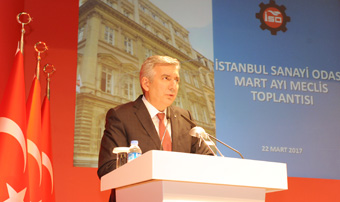
The ordinary assembly meeting of Istanbul Chamber of Industry (ICI) for March was held at the Vocational Training Complex of ISOV (Istanbul Chamber of Industry Foundation) on March 22, 2017 under the main theme: “The Importance of the 4th Industrial Revolution and Smart Factories for Our Industry in Light of New Technological Developments.” Two prominent guests were present at the assembly meeting chaired by President of Assembly Zeynep Bodur Okyay: Cengiz Ultav, President of the Technology Development Foundation of Türkiye (TTGV) and Professor Hakan Temeltaş, Lecturer at Electrical-Electronics Faculty of Istanbul Technical University gave detailed presentations to members of the assembly on the 4th Industrial Revolution and smart factories, the two major issues of industry and production in recent years.
Erdal Bahçıvan, Chairman of the Board of Directors of ICI drew attention to how smart factories increased in number with the advent of the 4th Industrial Revolution where multifunctional robots are used in loading and unloading in addition to many other areas:
“It is imperative that Türkiye does not lag behind in this race. To boost the technological development of our industry, we are willing to engage in cooperation for many projects with the Technology Development Foundation of Türkiye.”

ICI Chairman Bahçıvan continued his remarks as follows: “Average duration of education in Türkiye is 6.5 years, a reality that stands in the way for qualified workforce required by the 4th Industrial Revolution. Unless we raise qualified workforce, we will fail to make headway in productivity and innovation.”
Bahçıvan said: “Just like before, EU considerably needs Türkiye today and will do so in the future. In order to maintain smooth relations between Türkiye and some EU countries, our counterparts need to adopt an even-tempered approach based on commonsense and empathy.”
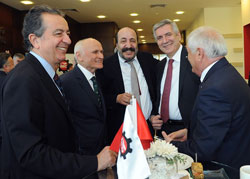
The ICI assembly meeting for March started with the opening remarks of President of Assembly Zeynep Bodur Okyay. Mrs. Okyay’s speech included the following highlights:
“It is predicted that until 2025, between 80% and 100% of production will be made via what we call internet of things, processes in which machines communicate with each other via sensors. In other words, factories will be managed by a single laptop in eight years’ time. These factories will increase productivity and work on a flexible production system to boost the strength of companies. ‘Competition of the future’ will be determined by these factories. It is assumed that one third of skills considered important in the labor market today will change in the next five years. On a large scale, robots will start taking care of lifting heavy pieces or assembling fragile pieces in factories. Some simple, repetitive operations will disappear.”

ICI President of Assembly
Zeynep Bodur Okyay
By contrast, with the increase of automation, competence requirements in the workforce will change. Above all, we will need to reinforce lifelong learning to teach rapidly-advancing technologies for more successful and competitive human resources. Without delay and from the most basic level we need to start raising the qualified workforce our country needs. Coding must be immediately included in primary school curricula. We are all aware of South Korea’s achievements thanks to this development. Many countries including chiefly the USA have taken major steps in coding education. This must now be a state policy in Türkiye.”
ICI President of Assembly Ms. Okyay later invited ICI Chairman Erdal Bahçıvan to deliver his speech on the main item of agenda of the meeting. Bahçıvan mentioned certain European states’ unfair and negative attitudes against Türkiye recently. He referred to inappropriate statements and behaviors from the Netherlands and Germany in the last few weeks and added: “We have witnessed how certain politicians and broadcasting organizations in these countries otherize our country and our people, using an inegalitarian discourse against our nearly 5 million compatriots living in Europe. I would like to especially note that under no circumstance do we accept such attitude.”

Bahçıvan added that the said negative attitude stems from the populism trend on the rise in recent times, with extremist and populist discourses expected to increase ahead of elections in many European countries in 2017. He said: “As our European friends continue to capitalize on Türkiye for the sake of their domestic political interests, we will experience unrecoverable resentments.”
Bahçıvan referred to Türkiye’s high-volume trade and economic relations with European Union countries which benefit all parties. He added: “We must never forget one fact: Just like before, EU considerably needs Türkiye today and will do so in the future. I would like to particularly note that our counterparts need to adopt an even-tempered approach based on commonsense and empathy in order to maintain smooth relations between Türkiye and the EU countries.”
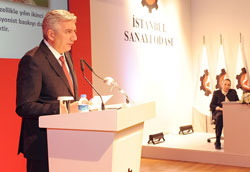
Bahçıvan also mentioned the main agenda item during his speech, adding that manufacturing processes and products have become “smarter” with the 4th Industrial Revolution. Bahçıvan also highlighted the change in manufacturing process with factories at the core of this process. He stated that just like mobile phones getting smarter, factories are becoming smart; “smart factory” is now a concept in literature, with prototypes in Türkiye and rapid growth in developed countries. He added the following remarks:
“Smart factory primarily aims to produce tailored, high-quality, and customized products and services on demand. Productivity, speed and flexibility will be of top priority in this process. Industrialists and Türkiye at large need to follow closer this substantial technological transformation that will create momentous impact in global economies. It is imperative that we, on behalf of our country, do not lag behind in this race considering our country’s great goals ahead and huge potential with a young and dynamic population.”
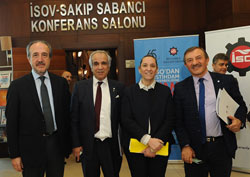
Bahçıvan remarked that Technology Development Foundation of Türkiye facilitates the digital transformation of Turkish industry while shouldering the duty of education to provide necessary workforce for this transformation. He underlined ICI’s desire to engage in cooperation for many projects with the Foundation.
Bahçıvan stated that the 4th Industrial Revolution ushered in a significant and radical change in business approach and added: “A brand new workforce culture is emerging as well. The definition of qualified workforce in particular is changing alongside current developments. Average duration of education in Türkiye is 6.5 years in Türkiye, a reality that stands in the way for qualified workforce required by the 4th Industrial Revolution. Let’s make one thing clear: Unless we raise qualified workforce able to use the technology Industry 4.0 needs, we will fail to make headway in productivity and innovation.”
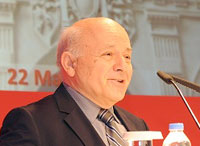
Cengiz Ultav, President of
Technology Development
Foundation of Türkiye
Following the speech by ICI Chairman Erdal Bahçıvan, Cengiz Ultav, President of Technology Development Foundation of Türkiye (TTGV), took the floor to give information to members of the assembly on his career, activities and TTGV. Ultav pointed out the importance of investing in young people with ideas and creative capacity. He referred to Türkiye’s dynamic richness and the significance of the next two decades for industrialists. He remarked that the upcoming term is defined as “era of tangibles”, with production according to demands by generations Y and Z becoming imperative.”
Ultav also noted that for a certain period, it was strongly suggested that the services sector was more profitable than production but now, production is gaining ground again. He mentioned a training he joined at Stanford University, adding that specializing in artificial intelligence, big data analysis and machine learning were held in high regard as opposed to the origin of a student’s diploma. According to Ultav, with the advent of the era of tangibles, traditional production approaches will be abandoned in the industrial and manufacturing sectors in the future. He noted that the era is defined as “re-production and making difference through production.”
Ultav also referred to how this new process transforms the structure of companies, with hierarchical structures inevitably evolving into horizontal and cellular ones. Ultav noted how people produce and share within a pool thanks to open systems, with a business mechanism founded on a just platform that generates added value. Noting on the huge potential TTGV sees in the youth, he stated their wish to become a part of efforts to bring Türkiye to the level of fastest productivity in the new term.
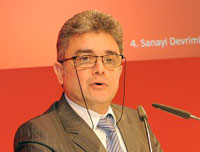
Prof. Hakan Temeltaş,
Lecturer at Faculty of
Electrical-Electronics Faculty at
Istanbul Technical University
Following Mr. Ultav, Prof. Hakan Temeltaş, Lecturer at Faculty of Electrical-Electronics Faculty at Istanbul Technical University, took the floor. He stated that he studied robotic systems in masters and PhD with a focus on Industry 4.0. Temeltaş defined 4th Industrial Revolution as a digitalization process that uses developing information and communication technologies in all sectors and economies including industry and trade. The revolution, according to Temeltaş, has three pillars: Digitalization, smart factories, interaction.
Temeltaş noted that customer-oriented production activities will gain momentum in the upcoming term, with a wider interest in responding to everybody’s needs in the same production line rather than using a separate production line for each customer. Temeltaş also mentioned the very high amount of data production today and stressed the importance of the use of analytics. Temeltaş referred to a study by TÜBİTAK which reveals top three technologies estimated to produce highest added value: Automation and control systems, advanced robotic systems and additive manufacturing. Temeltaş also mentioned the top three sectors with highest potential for added value, namely machine and equipment, computers, electronic and optics products, automotive and white goods sub-industry.
Temeltaş noted that assembly in factories in the future will not be controlled centrally, with the design of unmanned factories and robotic systems developed to work with humans. He pointed out to the change of engineering format today and added: “There is a substantial amount of information around the world. Knowledge and science is not a secret but technology is. An engineer capable of deriving new knowledge out of existing knowledge and analyzing it is considered a beneficial engineer.”
Following the speeches, members of the assembly shared their opinions on the main item of agenda.
